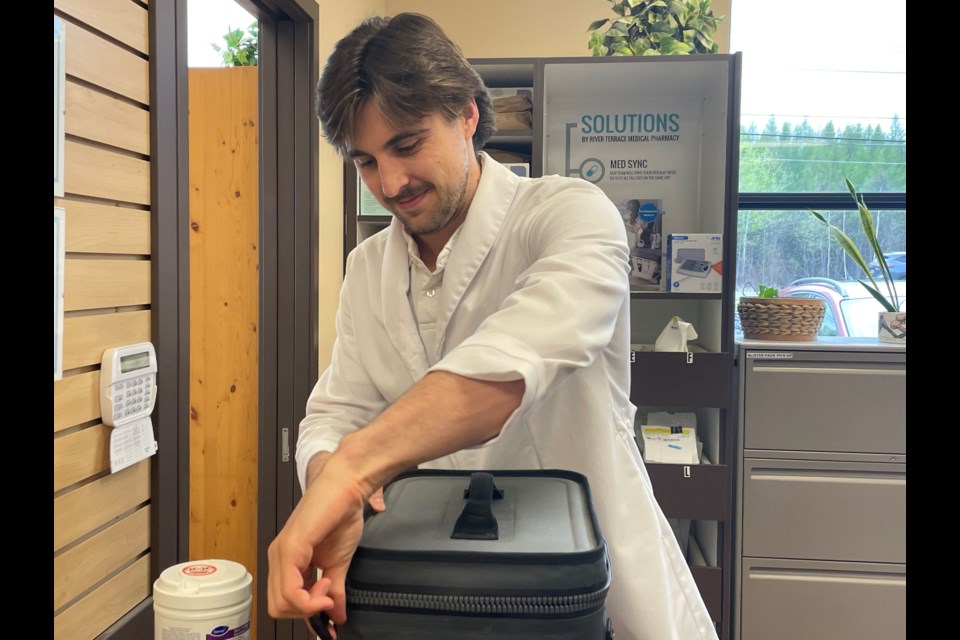THUNDER BAY — The sky is no longer the limit when it comes to prescription delivery.
Script Runner, a health-tech company based out of Toronto, has partnered with Oak Medical Arts to test a new drone delivery system for prescription medications poised to dramatically improve access to medicine – particularly for those living in remote locations, including First Nations communities.
Script Runner was founded in 2023 and specializes in using artificial intelligence-powered medication delivery software to provide “last-mile” solutions to pharmacies and medical professionals.
Adam Plummer, co-founder and head of operations at Script Runner, said the company was born out of a recognized need for better access to medications and a better delivery system.
“We care a lot about the customer as well.
"We take pride in delivering medications to patients to increase their quality of life, to get rid of those barriers and let them have access to great healthcare,” he said.
Plummer described ScriptRunner’s partnership with Oak Medical Arts as a “pilot project.”
“The biggest thing that we want to do is solve their prescription delivery and also give them technology that they’re able to add more time to their day and take less time dealing with logistics,” he said.
Dougall Media reporters and other media representatives were onsite at Oak Medical Arts's location on Golf Links Road on May 22 to witness a test run of the first drone delivery.
Despite windy, overcast conditions, the drone – a DJI FlyCart 30 piloted by drone technician Cameron Rowe – faired extremely well as it flew into position to receive its first delivery.
The drone then lowered a winch to which Rowe attached a container with insulin inside before making a 30-kilometre journey northwest to a woman in Trout Lake.
The delivery was successfully made in just under 40 minutes.
Plummer identified some of the potential variables that could affect drone delivery – such as wind direction, temperature fluctuation, and generally unfavourable weather conditions – but asserted the versatility of the drone technology ScriptRunner is working with.
“These drones are definitely very resilient, so I think we’ve got the right drone for the job,” he said.
“Drones are something that are going to be able to get into those pockets – places where traditional lines of transportation won’t be able to get to . . . you’re able to get through pretty much any situation with a drone.”
Speaking to Dougall Media, Robyn Despins, executive director at Oak Medical Arts, also weighed in and addressed why this pilot project is the perfect fit for Thunder Bay and communities across the region.
“I think we all recognize that in Northern Ontario there is a huge need – but it’s not just Northern Ontario.
"There are people who are sick at home with young kids, people who have mobility issues, people who are really not feeling well, and it’s just not possible for them to get in to get the prescription or the healthcare that they need.
“The future of what this looks like for drone-delivered prescriptions is very needed and necessary, not only in rural and more secluded places like Northern Ontario but across the world,” she said.
She acknowledged there are many places in the region which aren’t accessible by car – such as remote, fly-in First Nations – and suggested this drone delivery system would not only grant access but make it timely as well.
While she confirmed that car delivery is currently paid for and provided free-of-charge by Oak Medical Arts, she could not say for certain the same would apply to drone delivery since it’s still too early to tell.
However, she did express her excitement about what this means for pharmacy care in Northern Ontario based on her own experience.
“As a locally-owned, small pharmacy here in Thunder Bay to have this innovative pilot project happening here is absolutely incredible.
"What it means for pharmacy care is also very exciting. I’ve seen, in my own career as a pharmacist, a number of times where people are not getting their medication when they need it because of these various reasons – they’re out of town, a long drive away, or they don’t have any transportation, countless reasons – so I think this could be a really positive thing for the future of helping people access to care when they need it,” she said.
